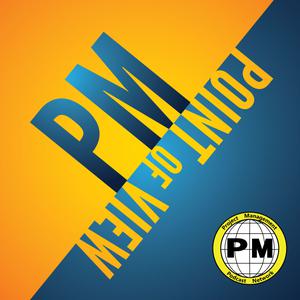
PM Point of View
Final Milestone Productions & M Powered Strategies
Conversations on Project Management in the Community
- 1 hour 5 minutesThe IMPACT Engine
The podcast features a panel discussion with Laura Barnard, the author of "The IMPACT Engine," and three professionals who have utilized her strategies: Willetta Love, an Associate Director of Project Management, Andrea Cirelli, Senior Director of a PMO, and Gregor Androjna, a business consultant. The conversation is moderated by Kendall Lott.
The IMPACT Engine is about accelerating strategy delivery, focusing on the human element in project management and change implementation. The panelists emphasize aligning projects with business strategy, fostering clear communication, and empowering leaders to drive impactful change. The discussion highlights the importance of understanding leadership needs, addressing root causes of problems, and ensuring that PMOs focus on delivering business value rather than just executing projects. The episode concludes with a call to action for project management professionals to adopt a strategic mindset and become impactful leaders.
12 September 2024, 4:46 pm - 57 minutes 22 secondsPM Game On!
Host Kendall Lott, along with guests Galen Low and Mike Hannon, discuss the evolving role of project managers (PMs) in the age of AI, emphasizing the need for PMs to adapt to stay relevant. While AI can handle routine administrative tasks, it cannot replace the strategic thinking, human relationship-building, and ethical decision-making that PMs provide. The conversation highlights the importance of shifting from task management to a strategic focus, where PMs are seen as leaders who drive business value. We like the right training, as we need more strategic thinking, business context, and ROI understanding. Effective PMs must bridge the gap between executive vision and project execution, fostering collaboration and communication to align projects with broader organizational goals. In the face of AI tools, which of course we should incorporate in our work, PMs need to be ambassadors for their discipline in an increasingly automated world.
9 August 2024, 5:40 pm - 59 minutes 27 secondsPM Discipline Integration in the Federal Government
Dive into the future of project management within the U.S. government in this engaging and insightful interview with key players from the USDA and NOAA. Hear from Jason Traquair, Kellie Cenzano, Daryl Frazier, and Joe Giraldi as they unveil their pioneering efforts and collaborations aimed at enhancing program and project management disciplines across their respective organizations. Discover the innovative strategies, such as building vibrant communities of practice and leveraging integrated value networks, that are set to redefine how government agencies achieve mission success and tackle challenges like catastrophic wildfires more efficiently. This conversation covers the tactical steps these leaders are taking today and also casts an exciting vision for 2029, where project management is not just a discipline but the fabric of effective and predictive government operations. Whether you're a seasoned PM professional or new to the field, this energetic discussion will leave you inspired about the future of project management in government service.
1 April 2024, 10:30 am - 58 minutes 47 secondsRisk and Resilience at the UMD PM Symposium (Revised)
Risk-- again! This episode with guests from the upcoming UMD Project Management Center for Excellence symposium is a thought-provoking discussion that takes a closer look at a crucial aspect of project management – risk management. We've gathered a dynamic trio of experts from diverse backgrounds to share their insights, experiences, and groundbreaking strategies on tackling risks head-on, making your projects more resilient and successful.
Joining us from the realms of technology, clinical research, and literary scholarship, our speakers, Lakshmi Sowjanya Uppala from Amazon, clinical project manager Jiwan Giri, and accomplished author John M Quigley, will share their unique perspectives on risk management. Whether it's developing prevention frameworks in software projects, navigating the challenges of clinical trials during an Ebola outbreak, or invoking the wisdom of the muses to refine our approach to risk, this episode will enrich your understanding and inspire you to view project risk management through a new lens.
So, buckle up and prepare to explore the intricate dance of risk and resilience in project management. Let's delve into the strategies that empower project managers to foresee the unforeseen, plan with precision, and lead their teams to triumph.
16 March 2024, 2:09 am - 57 minutes 16 secondsPeople in Projects at the UMD PM Symposium 2024
Heralding the annual arrival of the flagship UMD Project Management Center for Excellence symposium, this episode has 3 of the presenters in the People and Projects track: Kevin Coleman, a visionary leader and the founder and CEO of KMC Empowerment, John Eskandar, a seasoned professional in project controls at Exelon and graduate of the UMD PM program, who brings a wealth of experience managing large-scale construction projects and Abbigail Meah-Ali, a manager of construction services at the National Gas Company of Trinidad and Tobago. From Trinidad to Maryland to Virginia, our guests span a wide geographic and professional spectrum, each contributing to a rich dialogue on the intersection of people and projects. Whether you're a project management veteran or a newcomer to the field, this episode is packed with golden nuggets of wisdom that you won't want to miss.
29 February 2024, 1:35 am - 58 minutes 53 secondsProgram Value Management
Challenged by the hosts, Kendall Lott and Mike Hannan, returning guest Steven Devaux takes his value break down structure (the "Golden Triangle") to a new level, looking at quantifying value of project within programs. That’s the obvious, the less obvious is looking at the need for this view point in critical areas such as public health, emergency response and national security. He emphasizes the need to prioritize or sequence projects within a program to optimize the schedule for maximum impact, where the focus is on delivering outcomes rather than just producing products. What might we achieve if public health professionals should be trained in program management to effectively deliver the benefits of their research? What we also need are feedback loops that give us the ability to reevaluate and adjust projects within a program based on emerging information and changing conditions. We'll start seeing value when we start focusing on return to mission rather than just the return on investment, it's about Program Value Management.
24 October 2023, 3:12 pm - 1 hour 16 secondsAsteroids
In this podcast episode, co-hosts Kendall and Mike are joined by guest Roy Mazel, a retired NASA project leader and guest lecturer. They discuss the Project Management complexities of asteroid missions, specifically, the OSIRIS-REx Psyche missions. As you might guess, the successful implementation of risk management strategies and the importance of technical integrity in the face of schedule pressure is the litmus test of getting these missions completed on time, on budget, and without failure. And what you might not expect, Roy highlights the importance of a strong organizational culture that values communication, listening to team members, and mentoring the next generation of leaders.
The discussion sheds light on the intricate project management involved in space missions and the lessons that can be learned from both successful and challenging endeavors. Listen to the podcast, and watch the news for outcomes of these two missions!
20 September 2023, 4:00 pm - 1 hour 44 secondsLet it Flow, Success without Force
In this episode, Kendall, Mike, and Wolfram Mueller discuss strategies to improve business workflows using the Theory of Constraints (TOC) and Critical Chain Project Management, focused on two things: underloading system constraints and buffer management (having a signal that our flow is or isn't working). One thing that pops out is the importance of calculating business cases and recognizing growth potential--that becomes the compelling case to get middle management on board with the change needed. Getting a team to underload (reduce the non-critical work) of key resources, while having other enabling resources waiting for action is a really hard concept to get managers on board with…until you let them figure out what is holding back their throughput and let them figure out the solution. And that is the big news: consultants can help you identify and work through the problem, but successful change happens with they get out of the way and let the dedicated middle management drive the change. It helps to foster a culture of learning, collaboration, and problem-solving among employees. It enables the self-organization that creates the fix. And evidence shows it out.
8 August 2023, 9:19 pm - 56 minutes 18 secondsGetting Out of Our Own Way
The crux of any success? It isn't the plan, it isn't the desire, not even the WIIFM, its EXECUTION. And organizational change is no different. Today's episode discusses the difficulties that organizations face when it comes to executing change. Once again guest and change management author and guru April Mills comes to us on the topic of change…but this time it isn't how to do it, but how she has seen managers institutionally throw up their own barriers to change even as they try to change…starting with outsourcing on the thinking to…professionals. It may be that we are so good at PM and Change techniques that we have once again lost the bubble…the point is to execute and create value. Recognizing and moving past the "aspiration ability gap," jumping through the hoops of just ticking boxes, we have to focus on execution and look for opportunities for acceleration. Managers are called to amplify positive responses to create belief ripples that lead to success.
Organizations can get in their own way,Eager to change but miss the play.Professionals may think they know the game, butFocus on outcome, not the timeframe.Sandbagging is when a project takes too long,Outsourcing your brain leads to execution gone wrong.The aspiration ability gap will widen and grow,Unless leaders look for signals, they miss seeds of value they should sow.
30 June 2023, 2:36 pm - 1 hour 1 minutePM Faceoff: Process vs Principles
So there we were at the 10th annual UMD PM Symposium, having the Great Debate of Process vs principles. Facing off were Crystal Richards, CEO of MindsparQ and Laura Barnard, CEO of PMO Strategies. One hour of back and forth and audience questions. In sum:
From the debate between Laura and Crystal,It's clear that project managers should grab the handle.Be a business leader and ask good questions,Embrace risk and change with no exceptions.
22 May 2023, 12:00 pm - 58 minutesListener Questions Revealed!
Elevating the Conversation about Project Management, with a twist. In this episode cohosts Mike Hannan and Kendall Lott take on some Listener Feedback. A running theme in the show is the actual and delineation of project manager, product manager, and program manager--so we jump on that! Of course, our main theme of its all about value, adding value and understanding projects as investments is once again threaded through the answers. But new things lurk--how do you agile on a fixed-price contract? What's the danger and opportunity in cross-functional teams and accountability when managing scrum teams in a matrix world? How can AI be used (or useful) to help project managers understand architecture, dependencies, and level of effort in order to generate a critical path. Listeners got questions; we got answers--listen in for them and send us your questions!
18 April 2023, 8:06 pm - More Episodes? Get the App
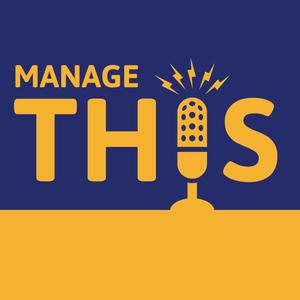 Manage This - The Project Management Podcast
Manage This - The Project Management Podcast
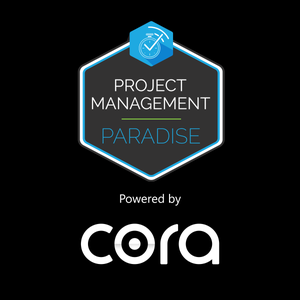 Project Management Paradise
Project Management Paradise
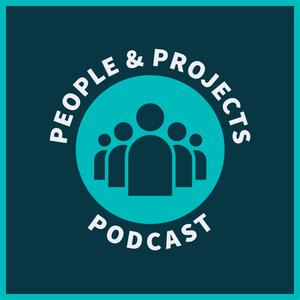 People and Projects Podcast: Project Management Podcast
People and Projects Podcast: Project Management Podcast
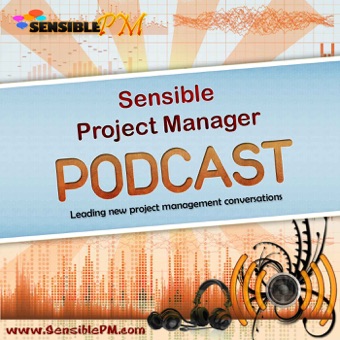 The Sensible Project Manager Podcast
The Sensible Project Manager Podcast
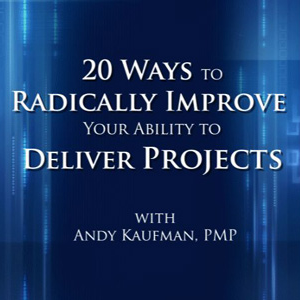 Free Project Management Videos from Andy Kaufman, PMP
Free Project Management Videos from Andy Kaufman, PMP
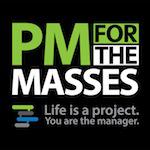 Project Management Podcast: Project Management for the Masses with Cesar Abeid, PMP
Project Management Podcast: Project Management for the Masses with Cesar Abeid, PMP
Your feedback is valuable to us. Should you encounter any bugs, glitches, lack of functionality or other problems, please email us on [email protected] or join Moon.FM Telegram Group where you can talk directly to the dev team who are happy to answer any queries.